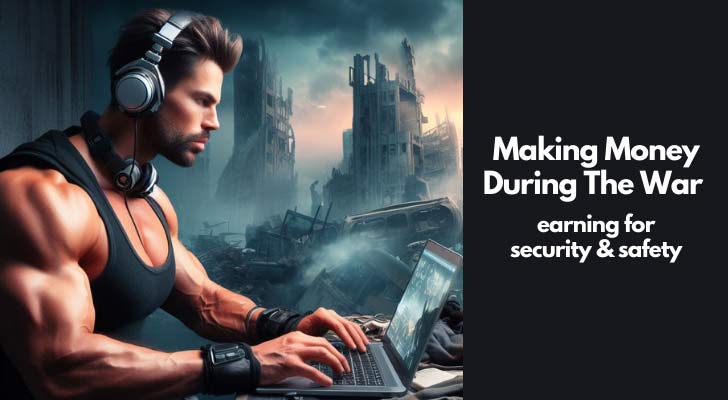Wartime brings uncertainty and challenges that many of us have never imagined. Yet, amid the turmoil, life goes on. But bills still need to be paid, mouths fed, and plans made for unexpected scenarios, like the need to evacuate. So is there a safety net in place?
Earning at Home: A Necessity
War's unpredictability can mean job losses, disrupted daily routines, and even direct threats to our homes. That means, finding alternative ways to earn becomes not just a luxury, but a necessity. But think about ways that people often talk about - freelancing, teaching, dropshipping... They're not possible because you never know when you need to flee. You cannot promise deadlines. Obviously your safety comes first. Especially you have your loved ones to protect.
The Need for Mobility
Earning money isn't just about day-to-day survival. It’s about having the resources to move quickly if your town faces a direct threat. Having a financial cushion can be the difference between being stranded and ensuring your family's safety.
Governmental Support
In times of war, national governments often establish emergency funds and relief programs. These might offer temporary financial assistance, food, shelter, or even evacuation aid to those in directly affected areas. While these programs can provide invaluable support, they might not cover everything, or aid may take time to arrive. Therefore, having personal financial security remains critical.
Did You Know?
- Global Peace Index: The 2023 Global Peace Index reported that 60% of countries worldwide experienced a decrease in peacefulness.
- Public Opinion on War: A survey found that over 70% of people in Western countries believe war is unnecessary in the modern world.
- Youth Perspectives: Around 65% of young people globally (aged 18-29) believe that peaceful negotiations are the best way to solve international disputes.
- Veterans on War: Approximately 80% of veterans from recent conflicts say they have a nuanced and often negative view of war, having experienced it firsthand.
- Gender Differences: Studies show that women are 10% more likely than men to view peace initiatives favorably.
International Aid and Organizations
Internationally recognized bodies, like the United Nations (UN) and the International Red Cross, play crucial roles during wartime. They provide humanitarian assistance, including food, medicine, and sometimes financial aid.
However, these organizations typically prioritize the most vulnerable populations: the sick, elderly, children, and those directly affected by conflict. So, while they provide much-needed relief, relying solely on them may not be a viable strategy for everyone.
Community Ties
In tough times, communities often band together. Neighbors help neighbors, and local organizations might provide support. Initiatives could range from shared food programs to housing those who've lost their homes. Engaging with your community, offering your skills, or even bartering can be ways to both contribute and benefit from local solidarity.
Flexible Online Income in Times of Conflict
In the midst of conflict, the predictability of a steady work schedule goes out the window. For those who still have access to the internet, even if intermittently, certain online avenues can offer flexibility without the pressure of strict deadlines.
Passive Income through Selling Devastation Images
If you've previously dabbled in photography, you might have a collection of photos on your hard drive. But you can report the devastation to the world by taking the photos of the current state and sell them.
Websites like Shutterstock or Getty Images allow you to upload these images for users to purchase. Once uploaded, these images can provide a source of passive income without further effort.
Is your country more important than yourself? Then I salute you for fighting for democracy, sir.
But remember, you don't have to be a hero. Run. Get to safety. You can be with your loved ones and do your best to protect them.
Promote Peace & Love, Not War [1]
- Hashtag Campaigns: Create a unique, memorable hashtag related to peace promotion. Use it consistently across your posts and encourage followers to do the same to amplify reach.
- Collaborate with Influencers: Identify and reach out to influencers who have shown interest in peace or humanitarian efforts. Offer them a content package or ideas they can share with their audience.
- Host Educational Webinars: Use platforms like Zoom or WebEx to organize webinars. Topics could range from the history of peace movements to non-violent conflict resolution. Promote these through email marketing and social media ads.
- Virtual Concerts or Art Exhibits: Use platforms like Twitch for concerts or ArtSteps for digital art exhibitions. Focus on themes of peace and love, and feature artists who share the cause.
- Create Interactive Peace Maps: Utilize Google Maps API to build a map pinpointing global peace initiatives. Make it shareable and encourage others to contribute by adding more locations.
- Launch Online Petitions: Platforms like Change.org are perfect for starting petitions urging for peace and diplomatic solutions. Share these petitions widely across social media channels.
- Develop and Share Peace-focused Content: Write blog posts or create videos that offer new perspectives on peace, then distribute this content through YouTube, Medium, or your own website, using SEO strategies to increase visibility.
Affiliate Marketing on Existing Blogs
If you already run a blog or have a social media channel with some following, consider affiliate marketing. Platforms like Amazon's Affiliate Program let you share product links, and you earn a commission with each sale made through your link. Since it's passive, there are no pressing deadlines.
Promoting products related to security, safety, and survival during times of conflict is a sensible idea. Amazon has a wide range of products that can be useful for individuals living in or near conflict zones. If you're considering affiliate marketing with Amazon or simply want to share useful products with others, here are some categories and items to consider:
1. Emergency Preparedness Kits
These kits typically contain the essentials needed to sustain oneself for several days in emergencies. This includes items like:
- Water purification tablets
- First aid supplies
- Emergency blankets
- Flashlights and batteries
- Whistles
Full HD Webcam with Built-in Microphone and Rotatable Tripod
Full HD Video and Wide Angle Lens - The Tewiky High Definition 1080p Webcam features a wide angle lens and delivers crisp clear images and fluid video at 30 frames per second while gaming, video calling, online teaching, live streaming, or recording.
We earn a commission if you click this link and make a purchase at no additional cost to you.
2. Personal Security
Products that can help individuals feel more secure or alert them to potential dangers include:
- Personal alarms that emit a loud noise when activated
- Door stopper alarms that sound off when a door is opened
- Pepper sprays for self-defense
3. Communication Tools
In times of conflict, regular communication channels might be disrupted. Tools that can help maintain communication include:
- Solar-powered radios to catch news broadcasts
- Walkie-talkies for short-range communication
4. Power Solutions
Electricity disruptions can be common, so alternative power sources can be invaluable:
- Solar-powered chargers for mobile devices
- Hand-cranked generators
- Portable power banks
5. Lighting
Ensuring you have a reliable source of light during power outages is essential for safety:
- Solar-powered lanterns
- Battery-operated LED lights
- Headlamps for hands-free operation
Did You Know?
- Education and Peace: 75% of people with higher education levels advocate for peaceful conflict resolution over military interventions.
- Economic Impact of War: Around 85% of the global population believes that war significantly hampers economic development.
- Impact of Media on War Perception: About 60% of people say media coverage influences their perception of war, often negatively.
- Children and War Perception: In conflict zones, over 90% of children express a strong desire for peace and normalcy.
- Perception of Nuclear Weapons: Approximately 55% of people worldwide are against the use of nuclear weapons under any circumstances.
6. Shelter and Warmth
Products that can offer protection from the elements include:
- Emergency tents or tube tents
- Mylar thermal blankets
- Waterproof matches or fire starters
7. Air Quality and Protectio
In some conflict scenarios, air quality might be compromised:
- Gas masks or respirators
- Air purifiers (battery-operated or manual)
8. Food and Water Storage
Having a stock of non-perishable food and clean water is crucial:
- Long-shelf-life emergency food bars
- Portable water filters or purification systems
9. Medical Supplies
Beyond basic first aid, some specialized medical products might be relevant:
- Tourniquets for severe bleeding control
- Burn creams or gels
- Splints for immobilizing injuries
10. Books and Manuals
Educational resources on survival, first aid, and other relevant topics can be invaluable:
- Survival handbooks
- Guides on edible plants or basic medical care
- Manuals on emergency preparedness
Make sure that your recommendations are genuinely useful and appropriate for the conditions at hand. It's also wise to advise people to consult local regulations or guidelines, as some items (like personal defense items) might be restricted in certain areas.
Cryptocurrency Faucets and Micro Earnings
Certain websites dispense a small amount of cryptocurrency for users who complete simple tasks or captcha. While the earnings are minute, they can accumulate over time, especially given the potential volatility and growth of digital currencies.
When traditional financial systems are under duress, whether due to war, hyperinflation, or other crises, cryptocurrencies can offer several advantages:
- .Diversification of Assets: Diversifying one's assets is a cornerstone of financial security. In times of economic instability, having some wealth in cryptocurrencies can act as a hedge against the plummeting value of a national currency.
- Decentralization: Most cryptocurrencies operate on decentralized networks. This means they aren't controlled by any government or financial institution. In scenarios where trust in centralized institutions erodes, this decentralized nature can be seen as a benefit.
- Portability: For those in conflict zones or facing potential displacement, cryptocurrencies offer a form of wealth that's highly portable. With access to a digital wallet, an individual can access their funds from anywhere in the world.
- Global Acceptance: As cryptocurrencies gain traction, their global acceptance is growing. This can be especially valuable if one needs to relocate to another country or make international transactions without relying on traditional banking systems.
- Inflation Resistance: Some cryptocurrencies, like Bitcoin, have a capped supply, which can make them resistant to inflationary pressures in the long run. This is contrasted with traditional currencies, which governments might print in excessive quantities during economic crises, leading to hyperinflation.
- Digital Gold: Bitcoin, often referred to as 'digital gold', is seen by some as a store of value, much like gold has been historically. In times of economic uncertainty, such stores of value can retain worth even as other forms of currency decline.
- Financial Sovereignty: Cryptocurrencies give users more control over their own money. They can be stored in personal wallets, reducing reliance on banks that might face solvency issues during economic downturns.
- Transparent Transactions: Blockchain, the underlying technology of many cryptocurrencies, provides a transparent and immutable ledger. This can offer a level of assurance and trust in the validity of transactions, especially when corruption or financial mismanagement is rampant.
Did You Know?
- Trust in Peace Talks: Only about 40% of people in conflict-affected areas believe that peace talks will lead to lasting peace.
- Mental Health and War: 70% of people living in war-torn areas report significant mental health issues due to constant conflict.
- Views on Military Spending: 65% of people in developed nations believe their government spends too much on the military and not enough on social programs.
- Perceptions of Terrorism: 80% of people worldwide see terrorism as a bigger threat than conventional war.
- Support for Peacekeeping Missions: 68% of the global population supports UN peacekeeping missions.
But as you know, there are big risks:
- Volatility: Cryptocurrencies can be highly volatile. Their values can fluctuate significantly in short timeframes.
- Security: Ensuring the safety of one's cryptocurrency holdings is paramount. Losses due to hacks, forgotten passwords, or mismanagement can be irreversible.
- Regulatory Concerns: Governments may take differing stances on the use of cryptocurrencies, which could impact their usability or value.
Promote Peace & Love, Not War [2]
- Organize Virtual Peace Rallies: Utilize Facebook Live or Instagram Live to host virtual rallies. Invite speakers from various backgrounds to share their messages and experiences related to peace.
- Email Campaigns: Use services like Mailchimp to design and send newsletters that educate subscribers on peace efforts and how they can contribute.
- Offer Online Courses on Peace: Platforms like Teachable or Udemy allow you to create and offer courses. Topics could include peace education, the psychology of conflict, etc.
- Art and Writing Contests: Announce a contest on social media and your website. Use a platform like Submittable to manage submissions. Offer virtual prizes or feature winners on your platforms.
- Digital Peace Pledges: Design a digital pledge on your website where visitors can commit to promoting peace. Use tools like Google Forms or Typeform for creation and tracking.
- Collaborative Art Projects: Use a platform like Miro or Padlet where artists can contribute pieces to a larger digital mosaic symbolizing peace.
- Charity Streams: Choose a streaming platform like Twitch or YouTube. Partner with content creators willing to dedicate stream time to raise funds for peace-promoting organizations.
Online Crowdfunding
Platforms like Patreon or Ko-fi allow individuals to seek support from the global community. While this isn't a traditional earning method, sharing personal stories or content in exchange for voluntary donations can sometimes lead to unexpected support.
YouTube and TikTok in Times of Conflict
In a world deeply connected by technology, platforms like YouTube and TikTok have become powerful tools for citizens in conflict zones to share their realities. Broadcasting the day-to-day happenings of a city at war can raise awareness, rally global support, and even document history as it unfolds.
1. Real-time Awareness
Platforms like TikTok, with their short-form content, are perfect for sharing real-time updates. Clips of daily life, immediate after-effects of events, or even silent panoramas can provide the global community a quick snapshot of the situation on the ground.
2. In-depth Narratives on YouTube
YouTube, with its longer video format, offers an avenue for more in-depth storytelling. Documentaries, interviews with locals, or even just personal narrations can paint a fuller picture of the conflict. The platform also allows for monetization, though it's essential to be sensitive about earning from distressing content.
3. Mobilizing Global Support
These broadcasts can lead to global awareness and support. Many times, international organizations, influencers, or even common people rally together for aid or political support upon seeing ground realities.
4. Emotional Connection
Beyond just presenting facts, sharing personal stories can create emotional connections. These platforms humanize the news, transforming numbers and statistics into real faces and lived experiences.
5. Safety Considerations
Using platforms to showcase conflict comes with significant risks. Ensuring personal and community safety is paramount. Always:
- Avoid sharing identifiable locations or faces without consent.
- Be aware of potential retaliations or targeting due to broadcasts.
- Use anonymous profiles or pseudonyms when needed.
- Consider the implications and potential consequences of each upload.
6. Ethical Broadcasting
It's crucial to ensure the authenticity and integrity of content shared. Misinformation or staged content can not only discredit the broadcaster but can also have far-reaching consequences in the portrayal of the conflict.
Did You Know?
- Impact of War on Children: Around 90% of people believe that wars have the most devastating impact on children.
- Awareness of War Crimes: 50% of people are aware of war crimes and human rights violations in conflict zones.
- Refugee Crisis Awareness: 75% of people in Western countries are aware of the refugee crises caused by wars.
- Perception of Civil Wars: About 60% of people view civil wars as more complex and harder to resolve than international wars.
- Optimism About World Peace: Only 30% of people are optimistic about achieving world peace in the next 50 years.
A Tool for Voices Unheard
YouTube and TikTok have really changed how we get our news and stories, haven't they? Before, big news channels controlled what we saw. But now, anyone with a phone can share what's happening around them. This is super handy, especially during tough times like wars.
In war zones, regular folks use these platforms to show the world what's really going on. This is a big deal because sometimes the news on TV doesn't show everything. People in these areas can also make some money from their videos. This helps them get by when things are rough.
It's kind of amazing when you think about it. With just their phones, people can tell their own stories and even help support themselves. It's a whole new way of sharing and seeing the world, right from the hands of those living the story.
Promote Peace & Love, Not War [3]
- Interactive Forums: Build a forum on your website or use platforms like Reddit to create a space for peaceful dialogue and exchange of ideas.
- Online Advocacy Groups: Create a private Facebook group or Slack channel for individuals committed to peace advocacy, providing a space for sharing resources and coordinating efforts.
- Virtual Reality Experiences: Collaborate with VR developers to create immersive experiences that depict the value of peace. Share these through platforms like Oculus or Steam.
- Social Media Challenges: Design a challenge that promotes acts of kindness or peace (e.g., "The Peace Letter Challenge" where participants send letters of gratitude or reconciliation) and use your hashtag to track participation.
- Share Peace Quotes and Stories: Curate a collection of impactful quotes and stories. Use graphic design tools like Canva to create visually appealing posts for social media.
- Digital Badges: Design digital badges with tools like Adobe Illustrator. Offer them to your community members to add to their email signatures or social media profiles as a sign of their commitment to peace.
How I "Finally" Make Over $7,000 Monthly Income
"The most valuable thing I've ever done!"








Please help me and my family. I lost everything to the war and conflict. My kids are starving and I really struggle to feed them day by day. I contacted every possible place but nobody helps me. I know you can help me from your blog service. I can work full time for you. I will do anything you ask. I am waiting for your reply.
Thanks for your comment but you’re wasting your time. I suggest that you contact public/charity organizations intead, not private websites. Make sure to show your valid passport to them.